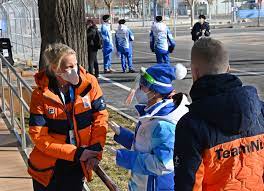Organizers wasting no time in ensuring Beijing 2022 a success

Beijing: With the Beijing 2022 Olympic Winter Games around the corner, organizers are keen to ensure the success of the event.
“Everyone is very much looking forward to the Beijing Winter Olympics, and wasting no time in ensuring it a complete success,” said Zhang Qian, head of the International Relations Department of the Beijing Organizing Committee for the 2022 Olympic and Paralympic Winter Games (BOCOG).
The International Relations Department is BOCOG’s primary channel for communication with the International Olympic Committee (IOC) and the Olympic family, with the Olympic and Paralympic family and National Olympic Committees (NOCs) being their main clients.
According to Zhang, the International Relations Department is responsible for providing protocol services to the Olympic and Paralympic family and the NOCs, language services, and undertaking the tasks of communication and coordination with related stakeholders, venue operation and quality checking, and epidemic prevention and control and entry services for Olympic personnel.
Around 3,000 athletes from 91 countries and regions and over 3,000 team officials will participate in the Games. Zhang said it will be a big task in terms of comprehensive coordination in providing services to these groups in Games time.
As for protocol services, BOCOG has finished the verification of flags and anthems for all participating NOCs, and prepared for over 10,000 flags in different categories.
A new language service featuring remote simultaneous interpretation will be applied for the first time in Winter Olympic history, and BOCOG has upgraded the multi-language call center, a legacy of the 2008 Olympic Games to offer online interpretation in 21 languages.
All competition venues and 11 non-competition venues will be equipped with language service teams in Games time, including experienced foreign interpreters and professional volunteers from universities who will provide both interpretation and translation services.
Zhang said the Beijing Winter Olympics has received widespread support from the international community.
“We have staunch support from the IOC and the Olympic family at every stage of our bidding and preparation for the Games. Especially in our final push toward the Games, officials from many countries have voiced their firm support in different ways,” she noted.
The Olympic Truce Resolution for the 2022 Olympic Winter Games in Beijing was adopted by the 76th session of the UN General Assembly last December.
Some heads of state, heads of government, members of royal families and heads of international organizations will attend the Games’ opening ceremony on February 4.
“This has shown the international community’s support for the Games itself,” said Zhang. “Besides support from the international community, especially in sports, we can feel during our preparation the athletes’ enthusiasm in participating in the Games in Beijing, as they regard it as the safest place at this stage.”
Shedding light on the challenges brought about by the COVID-19 pandemic in Beijing 2022 preparation, Zhang said that multiple rounds of negotiations have been conducted between BOCOG and the IOC and other stakeholders before releasing two editions of the Playbook.
“As a main channel of communication within BOCOG, the International Relations Department has to precisely understand the needs and opinions from all participants and respond to their concerns to ensure that important information will be exchanged between related departments of BOCOG and overseas stakeholders,” Zhang explained.
“We also held briefings to expound on the Playbook to different groups of participants and ensure sufficient communication and mutual understanding and support between different sides. The most important thing is to ensure that every participant can abide by it,” she added.
Zhang said that based on epidemic prevention and control, BOCOG has made some innovations in protocol services inside the venue, with different drop-off zones, parking areas, lobbies, tribunes and lines in place for Olympic family members inside and outside the closed loop to avoid any intersection.
“Our Games-time mission will be complicated and difficult to unravel,” admitted Zhang, while also expressing her confidence in figuring it out in terms of service and safeguarding.
“We have a professional team, including some sophisticated experts who served for the Beijing 2008 Olympic Games preparation and young people with foreign language prowess and rich experience in foreign affairs.
“I think the preparatory work that they did ahead of the Games will be the most cherished and best memories in their life,” said Zhang.





